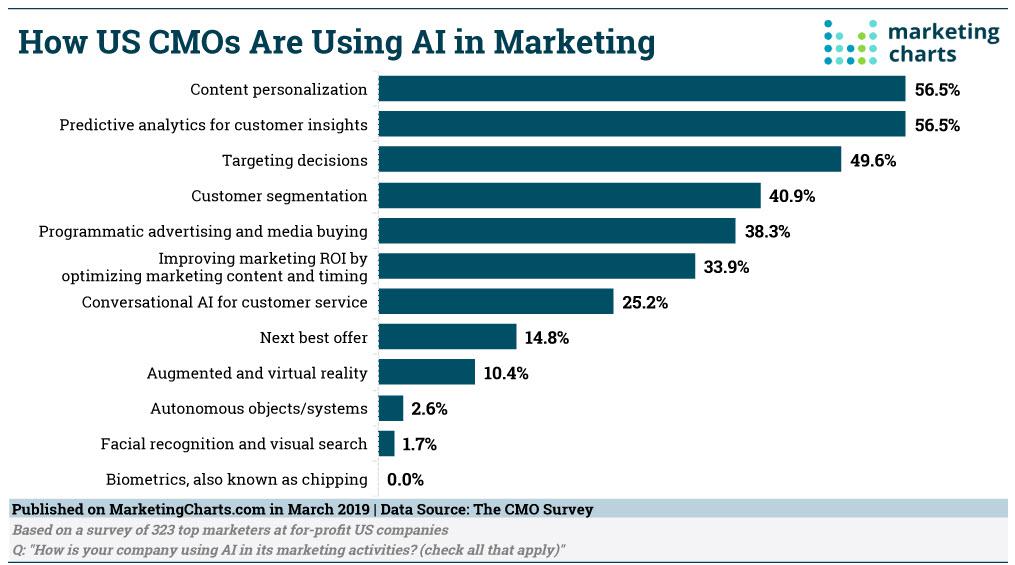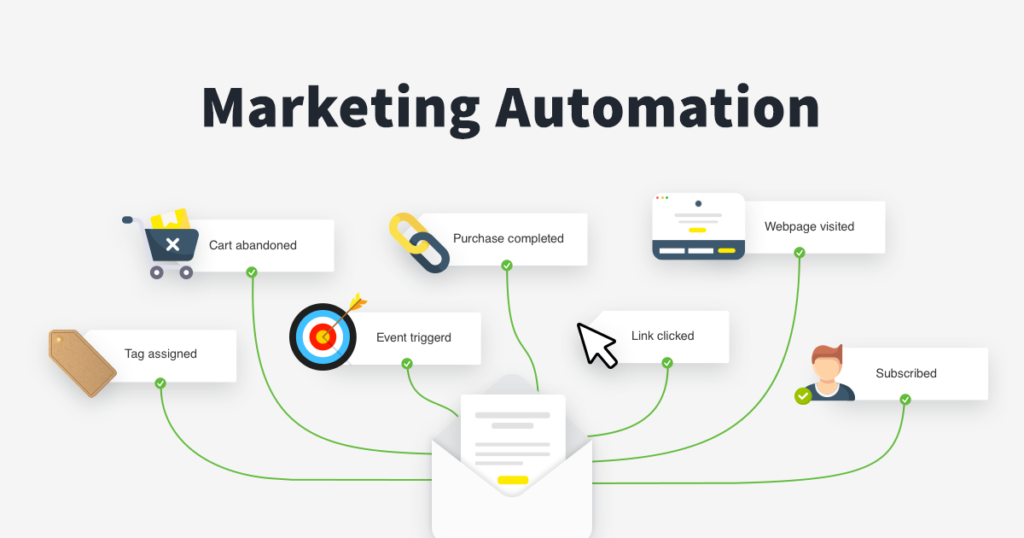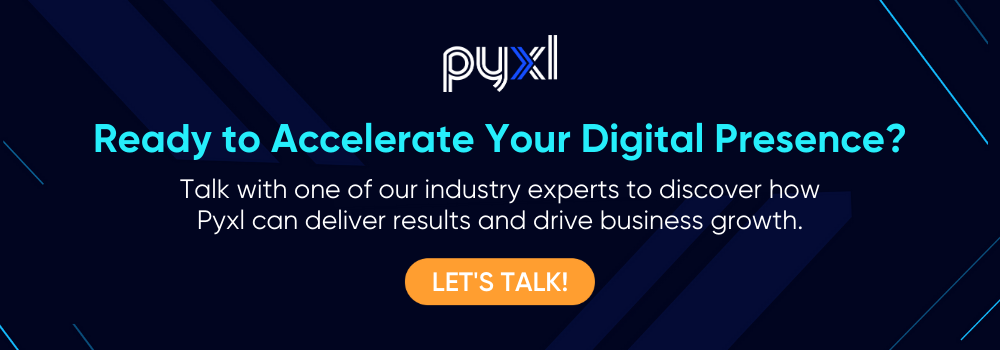The world of artificial intelligence (AI) continues to evolve and grow based on the needs of businesses, making it an incredible resource to utilize on a regular basis and for a variety of purposes. A study from McKinsey Analytics reveals that AI, within the media sector, is projected to lead the charge in the marketing and sales segment of the industry, totaling an expected $300 billion in revenue for that area itself. The AI growth trend indicates an increased reliance on creating processes that are more user-friendly and efficient.
Therefore, the economic question arises, will artificial intelligence replace jobs once performed by humans? You’ve probably seen movies about robots taking over the world, but don’t worry, that’s not the case here (at least we hope not…). In this blog, we’ll discuss AI’s influence on marketing and sales as well as the importance of still needing human interaction when building customer relationships and closing deals.
The influence of AI
Believe it or not, we interact with artificial intelligence regularly on a daily basis. AI helps us choose the next TV show we’ll watch, plan our travel routes and avoid spam emails. Our personal lives aren’t the only places where AI is a mainstay. Business professionals are also embracing AI to streamline everyday processes.
However, many industries are concerned about the effects of AI in terms of devaluing or replacing jobs completely. These projections sometimes exaggerate reality. Recent MGI research found that around just 5% of occupations can be nearly fully automated from a technical standpoint; however, 60% of occupations had about a third of their tasks that could be technically automated.
Yes, AI will inevitably change some of the tasks we do daily, but we also believe it will contribute to making work more efficient and more effective when used correctly. AI is here to stay, so instead of thinking of AI replacing jobs, instead think of how much more we as humans can accomplish with the help of automation. AI is presenting us with the future of how businesses should be operating, and we must adapt our current processes to work WITH AI, not against it.
Let’s address some of the common misconceptions about AI and discuss the real impact it has on our everyday lives.

Myths #1 AI is taking jobs from business workers
Reality
Automating repetitive tasks, such as customer service, database management, and radiology, has been made possible with the help of artificial intelligence, but the use of AI will typically lead to new job creation or changing existing jobs. What does that mean for server administrators? It means they can work on more challenging projects that can result in more business growth opportunities. By automating repetitive and low-ROI tasks, AI can free up your time for more valuable tasks, such as connecting with qualified leads. One of the ways in which AI is creating new tasks is the use of marketers who are overwhelmed with data. AI can organize the data while marketers will have access to simple dashboards to analyze content in the future.
Myth #2 AI is replacing human interaction
Reality
The use of AI and automation is a great way to ensure there is an ongoing interaction between your business and prospects as they move through the buyer’s journey, resulting in a great experience. However, while AI can support and supplement human interactions, such as 24/7 chatbots that provide valuable information to users after hours, it should not replace it entirely. Your customers still want a human experience.
It’s the only way to really build connections and relationships with your customers. The key to building a loyal customer base is to create a personal experience at some point in the buyer’s journey and to establish a face to the brand. That could mean having a real-life customer support specialist answering chat questions during business hours, or reaching out on the phone or in-person when prospects are in the decision stage, or checking in with clients from time to time to create a great customer experience.
Myth #3 Intelligent machines learn on their own
Reality
That is not the case. The worlds of the Terminator and machines taking over the world seem to only exist in our imaginations. A machine can only be intelligent if the data scientist provides it with the information it needs. As a result of its completion, an item appears to be able to learn by itself. However, experienced human data scientists frame the problem, prepare the data, determine appropriate datasets, remove potential bias in the training data and, most importantly, continually update the software to enable the integration of new knowledge and data into the next learning cycle.
Myth #4 My business does not need an AI strategy
Reality
As AI can influence strategy in every industry it is a good idea to find ways to apply it to a firm’s challenges. Technology is going to continue to grow, so it’s best that businesses rethink their business models now in order to adapt to the inevitable. Businesses that avoid artificial intelligence may be at a competitive disadvantage in many ways, as it is comparable to avoiding the next phase of automation. To leverage AI’s potential, organizations will need to develop applications that enhance performance, decision-making, and interaction and provide opportunities for innovation. These applications also come in software and tools that you can easily integrate into your system.

Myth #5 AI is approaching human intelligence
Reality
For artificial intelligence to function, humans need to develop algorithms and information to do so. It is built, taught, and designed so that it can act on our behalf. It’s undoubtedly true that intelligent machines are gaining an ever more significant advantage over humans in increasingly complex tasks like generating musical melodies and playing Go. However, they still lack creativity, agency, and accurate intelligence. Adaptive learning techniques turn AI systems into systems that can learn from their experience and apply it to various problems. However, machines with human-like intelligence remain a long way off.
Myth #6 You need data scientists, machine learning experts, and huge budgets to use AI for the business.
Reality
Through the integration of AI tools, this problem is becoming easier to solve. In CRM platforms such as HubSpot, email automation and social automation features can integrate at the tap of a button. Eventually, your company may require more sophisticated systems, but these tools will improve your company’s processes until that time.
Partner with Pyxl
So to answer your question, “Will AI replace jobs once performed by humans?” The answer isn’t that AI is replacing jobs, but more so enhancing our capabilities to do more with AI. At the end of the day, you still need human connection and interactions to effectively use and incorporate AI into your everyday business processes. The world of automation is continuing to evolve, and you’ll need to adapt to keep up.
The team at Pyxl is skilled at implementing automation to streamline processes and grow your business. Contact Pyxl to learn more!
Updated: Apr 13, 2022
 Bonnie Winter
Bonnie Winter

 Kati Terzinski
Kati Terzinski Erin Murray
Erin Murray